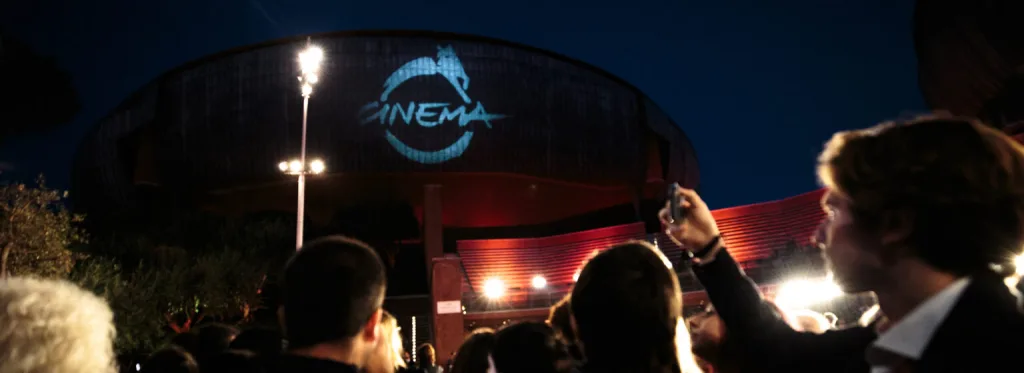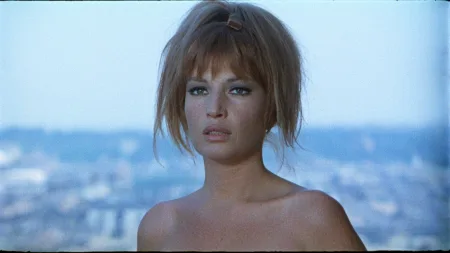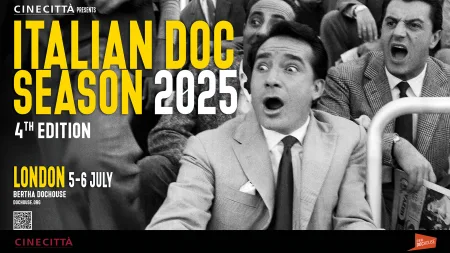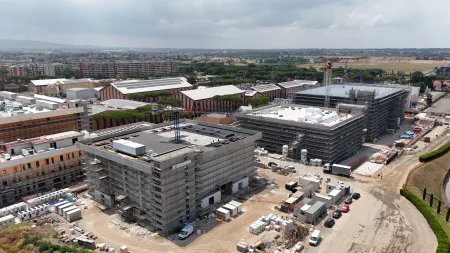28 September 2023
Cinecittà at the Rome Film Fest with seven films and two restorations
Cinecittà treads alongside and within the Festival with documentaries and restorations, productions shot in its stages, through MIAC - the Audiovisual and Cinema Museum

Luce Cinecittà is at the 18th Rome Film Fest with seven films and two restorations, as well as numerous collateral initiatives. “The Italian Film and Audiovisual System,” say Chiara Sbarigia and Nicola Maccanico, respectively President and CEO of Cinecittà, “is experiencing an industrial and creative season of noteworthy changes, enticing the protagonists of the audience system to accompany and promote it. The audience has been reacting positively, confirming its desire to return to the movie theater and enjoy great stories and emotions, after the years of the pandemic. In such times, Cinecittà has the ambition of becoming once again a dynamic and driving protagonist, solidly at the center of the scene and the market. Major domestic and international productions enliven its studios, and important filmmakers and stars have chosen Cinecittà to work in an international film Capital. The iconic charm of the place is thriving more than ever while stretching out towards the future. In addition to its soundstages, attention to new technologies, and the environment, Cinecittà is reexamining the cultural role of the Luce Archives, adding podcasts, documentaries, film restorations, and exhibitions, along with classic and contemporary film reviews. Faithful to its original vocation summarized by its founding acronym (UCE, the Educational Cinematographic Union), it has reorganized its professional training offer. With the Film Festival, Rome encounters the world as an elective place of the imagination. It does so with its 18th edition, in Italy the age symbol of adulthood. Cinecittà treads alongside and within the Festival with documentaries and restorations, productions shot in its stages, through MIAC – the Audiovisual and Cinema Museum, now offering visitors an increased collection – and with audiovisual and editorial initiatives to tell the story of a creative industry that is experiencing a season of growth and greater awareness of its competency. At the same time, as for every “Festa”, with an unchanged desire to enjoy the thrill together.”
Following are the selected Luce Cinecittà titles:
Fela – il mio Dio vivente by Daniele Vicari (Production: Fabrique Entertainment, Luce Cinecittà, Lokafilm doo, Grasshopper Films; Distribution Luce Cinecittà).
Early 80s. A young director, Michele Avantario, meets the great Nigerian musician and revolutionary Fela Kuti and from then on dedicates his life to making a movie starring the musician. Despite not succeeding in his intent, he discovers something more important: a new idea of existence. Fela is one of the most controversial African musicians and leaders who fought for human rights despite defamation, harassment, and countless imprisonments by the Nigerian government. A hero in the eyes of many Africans, he has conquered the international music market by producing over 80 overtly political records.
“Michele Avantario’s tale is the story of an overwhelming passion for cinema, music, and Africa,” says Daniele Vicari, “The story of a boy who becomes a man by chasing a lifetime dream: making a film about the legendary and charismatic Fela Kuti. My intent with this movie is to narrate the simple but powerful story of a boy who encounters a living myth and tries to make an impossible film. A story that plays, dances, smokes, loves, travels, and tastes of Africa, politics, and of the 70s, overcoming every form of colonialism, even the ‘inner’ one we still carry within us today.”
Mur by Kasia Smutniak (Production: Fandango in association with Luce Cinecittà; Distribution: Luce Cinecittà).
Mur is Smutniak’s documentary directing debut, written by the actress with Marella Bombini. In March 2022, a few days after the Russian invasion of Ukraine, Europe mobilized to give asylum to refugees. The country that stood out for its timeliness and generosity was Poland, the same country that has just started building the most expensive wall in Europe to prevent the entry of more refugees. A strip of land that runs along the entire Belarusian border, called the red zone, prevents anyone from approaching and seeing the construction of the Wall, the true protagonist of this film. Kasia Smutniak makes her directing debut with a film that is both an intimate diary and a condemnation. The movie, an uncertain and risky journey into the red zone where access is not permitted to the media, begins in front of a wall and ends in front of another wall. Thanks to the help of local activists and with extremely light technical equipment, the director reaches the border and films what has not been told yet. The first wall hinders the immigrants that arrive from distant lands from crossing the oldest forest in Europe, Puszcza Białowieża, an impenetrable border lost in a sea of trees – a new element for the thousands of people who attempt the journey. The second wall faces the windows of her grandparents’ house in Lodz, where the director used to play as a child: it’s the wall of the Jewish cemetery of the Litzmannstadt ghetto. Trying to reconcile with her past, Kasia Smutniak returns home with sharp awareness: sheltering refugees should not allow for distinctions, anyone in danger must be helped, and a continent considered democratic should not build walls.
Posso entrare? An Ode to Naples by Trudie Styler (Production: Big Sur, Mad Entertainment and Rai Cinema; Distribution: Luce Cinecittà)
aples, a city of culture and creativity, is too often abandoned to chaos and criminality. With a foreigner’s gaze in love with the city after two years of visiting it, Trudie Styler has taken up the challenge of a documentary that pans on this unique city unfolding its contrasts of beauty and pain, light and darkness. By letting the people of Naples tell their own stories, she reveals a city of generosity and cruelty, a city of light and shadows, through interviews with Don Antonio Loffredo, a rebellious and enlightened parish priest of the Sanità district, the actor Francesco Di Leva founder of the NEST Theater in San Giovanni a Teduccio, writer Roberto Saviano, the artist Jorit, Neapolis, the original song by Clementino, but also “strong women warriors” who fight for women, the castagnari, Antonio, veteran of the Four Days of Naples during the Second World War. “As a director of British origins but resident in the United States, I am the perfect definition of an outsider,” says Trudie Styler, “I’ve lived in Italy for two decades, but as any Neapolitan would tell you, Tuscany is not Naples. Sophia Loren said it better: I’m not Italian, I’m Neapolitan. Naples is a culture within itself. What my view can offer Naples is extreme wonder and extreme curiosity. Fresh eyes that look upon the city with attention and compassion. Naples has survived for 3000 years. It is not at all a new reality to be depicted, but it certainly is an extraordinary one.”
Io, il tubo e le pizze by Ugo Gregoretti – The posthumous film of the great director, shot in 2016 and freely based on his autobiography also dedicated to the city of Naples, where Gregoretti lived as a child (Production: AchabFilm – Distribution: Luce Cinecittà)
Io, noi e Gaber, by Riccardo Milani (Production: Atomic s.r.l. in collaboration with RAI Documentari and Luce Cinecittà).
L’enigma Rol by Anselma Dell’Olio (Production: La Casa Rossa with Rai Cinema in co-production with RS Productions and Pepito Produzioni in association with Luce Cinecittà).
Do paranormal phenomena exist? Can events be inexplicable? Is there life after life? Are there other dimensions beyond the one we live in every day? Was Gustavo Rol an Initiate, a trickster, or more simply a mystifier? These are the questions director and screenwriter Anselma Dell’Olio and her co-screenwriter and artistic producer Alessio De Leonardis started out from to describe one of the most controversial figures of the twentieth century. Through testimonies, archive material, photographs, footage, and reconstructions, Enigma Rol is at the same time a portrait, an investigation, and a compendium of the character, personality, and works of the controversial Turin psychic Gustavo Adolfo Rol (1903-1994). To shed light on this inexplicable and at the same time fascinating and mysterious person, terms such as “paranormal”, “extrasensory” or “parapsychological” are not enough. Throughout his life, Gustavo Rol was much more. Some called him a “vulgar illusionist” (among the most skeptical was Piero Angela) and some considered him a spiritual master, an enlightened man, put on Earth to make humanity better and even extraordinary; among the latter Franco Zeffirelli, Federico Fellini, Vittorio Valletta, Cesare Romiti, Sergio Rossi, Jean Cocteau, Adriana Asti, Valentina Cortese, Giorgio Strehler, Luciana Frassati Gavronska, and many others.
Profondo Argento by Giancarlo Rolandi and Steve della Casa (Production: Baires Produzioni in collaboration with Luce Cinecittà).
ario Argento, one of the most acclaimed Italian directors worldwide and the object of a transversal cult that breaks down generational barriers, has always defended his private sphere. A life full of satisfaction, his unmistakable features have been a constant presence in the world of entertainment since his debut, more than fifty years ago, with an almost mythological title, L’uccello dalle piume di cristallo (The Bird with the Crystly Plumage). This documentary revolves around ten themes: his mother coming from a famous family of photographers, the Luxardos, his father, a producer, his beginnings as a critic and screenwriter, his directorial debut, his relationship with music and architecture – fundamental elements of his work – his masters, friends and imitators, his literary and film tastes, the evolution of genres and his career, his daughters Fiore and Asia. And finally, his true dark side: comedy, which often surfaces in his daily life even within his visionary nightmares. This journey is enriched by footage of his works, photos, and documents from his jealously guarded personal archive.
RESTORATIONS:
Divisione Folgore (1954) by Duilio Coletti – Restoration by Cinecittà
The movie stars Terence Hill (credited with his real name Mario Girotti) and takes place during WW2 during the battle of El Alamein seen from the point of view of a group of young paratroopers of the Folgore Division.
Stromboli terra di Dio (1950) by Roberto Rossellini – Restored on the occasion of the Lifetime Achievement Award to Isabella Rossellini by Luce Cinecittà, Cineteca di Bologna, CSC-Cineteca Nazionale.
At this 18th Rome Film Fest, Isabella Rossellini is being presented with a Lifetime Achievement Award. For the occasion, she has selected a few films that have touched her personally, among which one of her father’s greatest, starring her mother, Ingrid Bergman. This version of Stromboli was restored by Luce Cinecittà, Cineteca di Bologna, and the Centro Sperimentale di Cinematografia.



